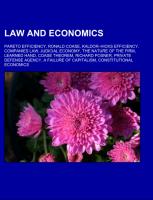- Start
- Law and economics
Law and economics
Angebote / Angebote:
Source: Wikipedia. Pages: 69. Chapters: Pareto efficiency, Ronald Coase, Kaldor-Hicks efficiency, Companies law, Judicial economy, The Nature of the Firm, Learned Hand, Coase theorem, Richard Posner, Private defense agency, A Failure of Capitalism, Constitutional economics, Steven N. S. Cheung, Frank H. Easterbrook, Socialism for the rich and capitalism for the poor, Property Rules, Liability Rules and Inalienability: One View of the Cathedral, Capital Market Imperfections, Information asymmetry, Guido Calabresi, Economics and patents, The Problem of Social Cost, Property rights, Prior-appropriation water rights, Contract theory, Henningsen v. Bloomfield Motors, Armen Alchian, Goods and Services Tax, Harold Demsetz, Alternative compensation system, Hedonic damages, Ugo Mattei, Donald J. Boudreaux, Calculus of negligence, Pure economic loss in English Law, Efficient breach, William Landes, Centre for the Comparative Analysis of Law and Economics, Economics of Law, Economics of Institutions, Bruce L. Benson, United States v. Carroll Towing Co., Imperial Preference, Daniel Fischel, Virginia school of political economy, Legal origins theory, Deep pocket, Gerrit De Geest, Forensic economics, Bayesian efficiency, Freedom and the Law, Hedonology, The Costs of Accidents, Economic law, George L. Priest, Collegio Carlo Alberto, Douglas Melamed, Nexus of contracts, Journal of Competition Law & Economics. Excerpt: Billings Learned Hand ( -id, January 27, 1872 - August 18, 1961) was a United States judge and judicial philosopher. He served on the United States District Court for the Southern District of New York and later the United States Court of Appeals for the Second Circuit. Hand has been quoted more often than any other lower-court judge by legal scholars and by the Supreme Court of the United States. Born and raised in Albany, New York, Hand majored in philosophy at Harvard College and graduated with honors from Harvard Law School. After a short career as a lawyer in Albany and New York City, he was appointed as a Federal District Judge in Manhattan in 1909 at the age of 37. The profession suited his detached and open-minded temperament, and his decisions soon won him a reputation for craftsmanship and authority. Between 1909 and 1914, under the influence of Herbert Croly's social theories, Hand supported New Nationalism. He ran unsuccessfully as the Progressive Party's candidate for Chief Judge of the New York Court of Appeals in 1913, but withdrew from active politics shortly afterwards. In 1924, President Calvin Coolidge promoted Hand to the Court of Appeals for the Second Circuit, which he went on to lead as the Senior Circuit Judge (later retitled Chief Judge) from 1939 until his semi-retirement in 1951. Scholars have recognized the Second Circuit under Hand as one of the finest appeals courts in the country's history. Friends and admirers often lobbied for Hand's promotion to the Supreme Court, but circumstances and his political past conspired against his appointment. Hand possessed a gift for the English language, and his writings are admired as legal literature. He rose to fame outside the legal profession in 1944 after giving a short address in Central Park that struck a popular chord in its appeal for tolerance. During a period when a hysterical fear of subversion divided the nation, Hand was viewed as a liberal defender of civil liberties. A collection of Ha
Folgt in ca. 5 Arbeitstagen
